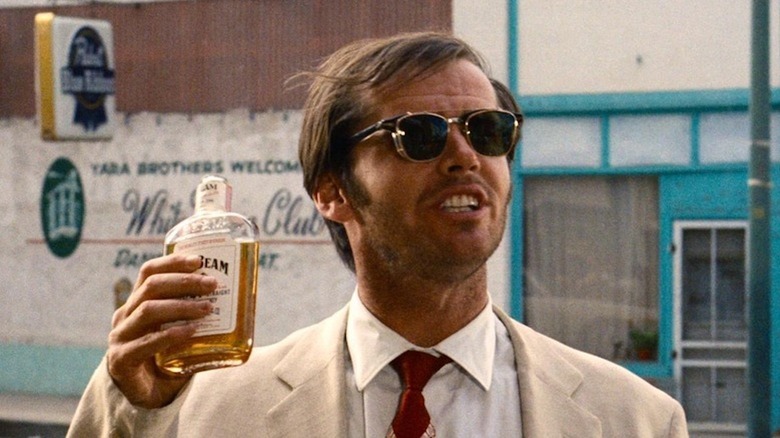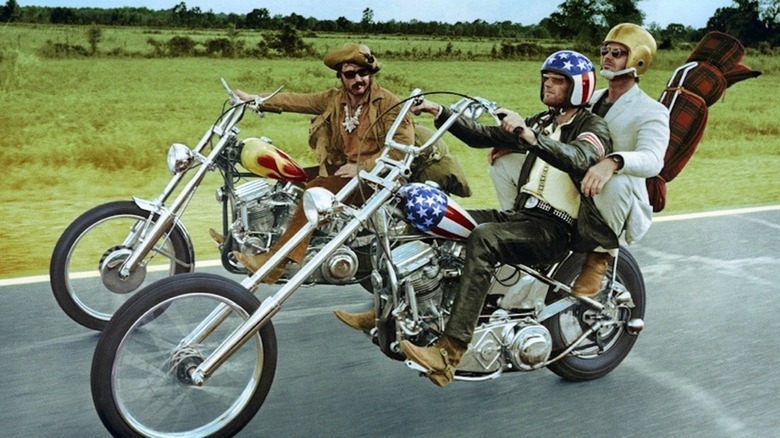The Classic Movie That Convinced Jack Nicholson To Stick To Acting
It's absurd to consider, but early in his career Jack Nicholson had a difficult decision to make. The New Jersey son of a showgirl had a shot at being an animator for Joseph Hanna and William Barbera in the 1950s, but the then teenager had his heart set on acting. This was not the difficult decision. That would come years later when, after a string of prominent roles in Roger Corman-produced B-movies, Nicholson wrote a well-regarded screenplay called "The Trip." It was so good that it left burgeoning movie star Peter Fonda in tears. This reception was ecstatic enough to convince Corman to direct it himself. And while Fonda was ultimately displeased with the final result, Nicholson immediately landed another screenwriting assignment collaborating with Bob Rafelson on the script for the absurdist Monkees comedy "Head."
In a 1985 interview with Film Comment, Nicholson revealed that his success as a writer got him thinking about a career as a director. "I wanted to be the guy who got to say whether the dress is red or blue," he said. "I'd still like to make those ultimate decisions. It's like action painting. It's not a question of right or wrong about red or blue, but that only one guy gets to say it — and if you don't get to, you're doing something else."
Nicholson's quest for control was not incompatible with continuing on as a performer. "As an actor, I want to give in to the collaboration with the director because I don't want my work to be all the same," he said. "The more this can be done with comfort, the more variety my work has had. I think this is inherent to the actors' craft. It is a chosen theoretical point of departure."
It was the late 1960s, and Nicholson had to contend with this push-pull. We know which way he went, and it's probably not a surprise as to which film drove him in the direction of being a movie star.
How Jack Nicholson just up and decided he was a movie star
Dennis Hopper's "Easy Rider" was arguably the most concussive cinematic bombshell of the late 1960s. It roared into theaters the same year as Woodstock, and, with its knockabout tale of two bikers riding across America after completing a drug deal, spoke to the Hippie-esque notion of turning in, tuning in, and dropping out. It was the perfect counterculture movie for the time, and quickly became a box office sensation, making full-blown stars out of Fonda and Hopper.
Though Nicholson had a supporting role as the alcoholic lawyer George Hanson, his Nicholson-ness could not be denied. Everything we love about Jack — his devilish grin, slick line delivery, and effortless sex appeal — is present in "Easy Rider." Did Nicholson know the film would be a zeitgeist-capturing smash? As he told Film Comment interview, "[I]t wasn't until the screening at the Cannes Film Festival that I had an inkling of its powerful super-structural effect upon the public."
Interestingly, prior to that screening, Nicholson had made up his mind: he was going to be a director. "But at Cannes my thinking changed," he said. "I'd been there before and I understood the audience and its relative amplitudes. I believe I'm one of the few people sitting in that audience who understood what was happening. I thought, 'This is it. I'm back into acting now. I'm a movie star.'"
It's not everyone who can watch themselves in a movie, declare they're going to be a movie star, and actually become one forthwith (Nicholson made good on his potential the following year in Rafelson's "Five Easy Pieces"), but Nicholson is no ordinary movie star. He appears to be retired at the age of 87, but he's left us with an embarrassment of onscreen riches. No one did it like Jack.

